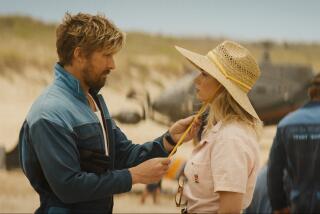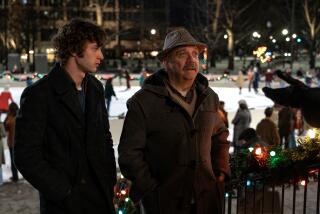‘Last Chance Harvey’ ‘s Dustin Hoffman and Emma Thompson
Dustin Hoffman and Emma Thompson are not at their best.
Despite jet lag from her transatlantic, transcontinental flight, Thompson still manages to look elegant though tired. Hoffman is under the weather; he has had some B-12-like shots today but asserts he was told, “My uvula’s OK,” then adds with a smirk, “I didn’t even know men had uvulas.”
FOR THE RECORD:
Dustin Hoffman: In some copies of today’s Envelope section, a listing of Dustin Hoffman’s awards said he won an MTV movie award for “Meet the Fokkers.” The movie title is “Meet the Fockers.” —
Thompson grants him the big laugh he sought and promises to pitch him that softball for their Q&A following this recent evening’s industry screening of “Last Chance Harvey,” their upcoming film about finding love where -- and when -- it is least expected.
“This is where we start lying and saying how much we loved working together,” Hoffman cracks.
“You start,” Thompson purrs, then plops down with him, or rather, on him, on the big, leather green-room couch. The two two-time Oscar winners have the easy chemistry of old friends, despite having worked together only once before, and barely at that, on 2006’s “Stranger Than Fiction.”
“The thing is, from time to time, you come across those with whom you have a sort of professional love affair, which is very unusual,” she says. “The last time I had it was with Anthony Hopkins, who was also older than me.”
“And shorter,” Hoffman adds.
“When did you last have it?”
“Never.”
“Oh, come on.”
“Once, when I met Anthony Hopkins,” he says, and Thompson emits a honking laugh. “No, never. I’ve never had this experience,” he insists.
After “Fiction,” Thompson, who had been taken by the BAFTA-winning film “Jump Tomorrow,” another story about finding unexpected romance, contacted filmmaker Joel Hopkins about working together. This Hopkins, it turned out, was a fan of Thompson’s first film, “The Tall Guy.” So he set about writing her a movie.
“Joel created [the role of] Kate as a sort of older version of my earlier character” in “The Tall Guy,” she says. “Someone who had been a nurse, very capable and straight-talking but not brilliant at personal relationships. Then along comes this American who is completely straight and very bold, actually, in a way that British men would never be, and she does something not everyone is able to do, which is she makes this leap of faith. With love it’s always that. It’s like joining a cult or something.”
Thompson brought Hoffman into the process of shaping the script into something specifically for them, and the result is rather like a mature-set “Before Sunrise.” In “Last Chance Harvey,” which opens in limited release Dec. 26, Hoffman’s title character, buffeted by the worst weekend of his life, is suddenly reckless enough to pursue a kindred spirit in Kate, exploring their emotional connection on an all-night walking tour of London. Indicating their shared relaxation on this green-room couch, Hoffman says such casual conversation as this is just how they wanted to do the film.
“I brought up ‘Love Actually,’ where [Emma’s character] finds out her husband’s being unfaithful. We’ve seen that scene a million times in movies and I never saw anyone do what Emma did, or maybe what she didn’t do. It was so powerful. It was what they used to say about Brando, that sometimes his acting was so personal you almost turned your head away. I said, ‘We should be that personal, somehow.’ We’ve made a career as character actors. This time we said, ‘What if we don’t paint that way?’ And we stayed as close to ourselves as I thought she had in that scene” from “Love Actually.”
The emotional intimacy the two wound up creating on screen was helped, Hoffman says, by a bit of self-control. “If you take the sexual component out, then the intimacy can be extraordinary. Because sex will sometimes take you off the intimate course; it pretends to be intimacy but can be a bar against intimacy. Whereas in life, if we hadn’t been married and just met, we probably would have been attracted to each other and we probably would have [had sex] and [messed] it up,” he says, both of them laughing. “We would have passed up this . . . “
“Other, better thing,” Thompson completes the thought, then adds: “Or more sustainable thing.”
“If you allow the attraction to be admitted,” without getting physical, he says, “there’s a combination of intensity and energy and relaxation at the same time. So we were in love, no matter what scene we were shooting. It was a great feeling. We were married, in the best sense of the word.”
There are points in the film in which they each show why they’re among the best at their profession, such as Thompson’s excruciating silence during a failed date at a bar, or Hoffman’s absorption of painful news from his on-screen daughter. But when considering each other’s work, the two pick even more subtle instances.
“Mine would be when you lose your balance on the pebbles in the restaurant,” says Thompson of a moment in which Harvey, already dreadfully uncomfortable, must quickly exit a room. “That’s one of my favorite moments in the entire film because I always laugh, and then feel really bad about laughing. It’s so awful and so funny at the same time. And it’s also quite a commentary on modern restaurants!”
Hoffman quickly explains he had slipped in rehearsal and decided to keep it for the actual take but then eagerly adds of his costar:
“Emma lives as full a life as anyone. And yet, she can be sitting on a bus -- a couple of times in this movie -- where she just puts her head against the glass and conveys such an extraordinary sense of aloneness. To me, it’s mind-boggling. It always hits me right in my viscera. Where is that coming from?”
Ordoña is a freelance writer.
More to Read
The biggest entertainment stories
Get our big stories about Hollywood, film, television, music, arts, culture and more right in your inbox as soon as they publish.
You may occasionally receive promotional content from the Los Angeles Times.






